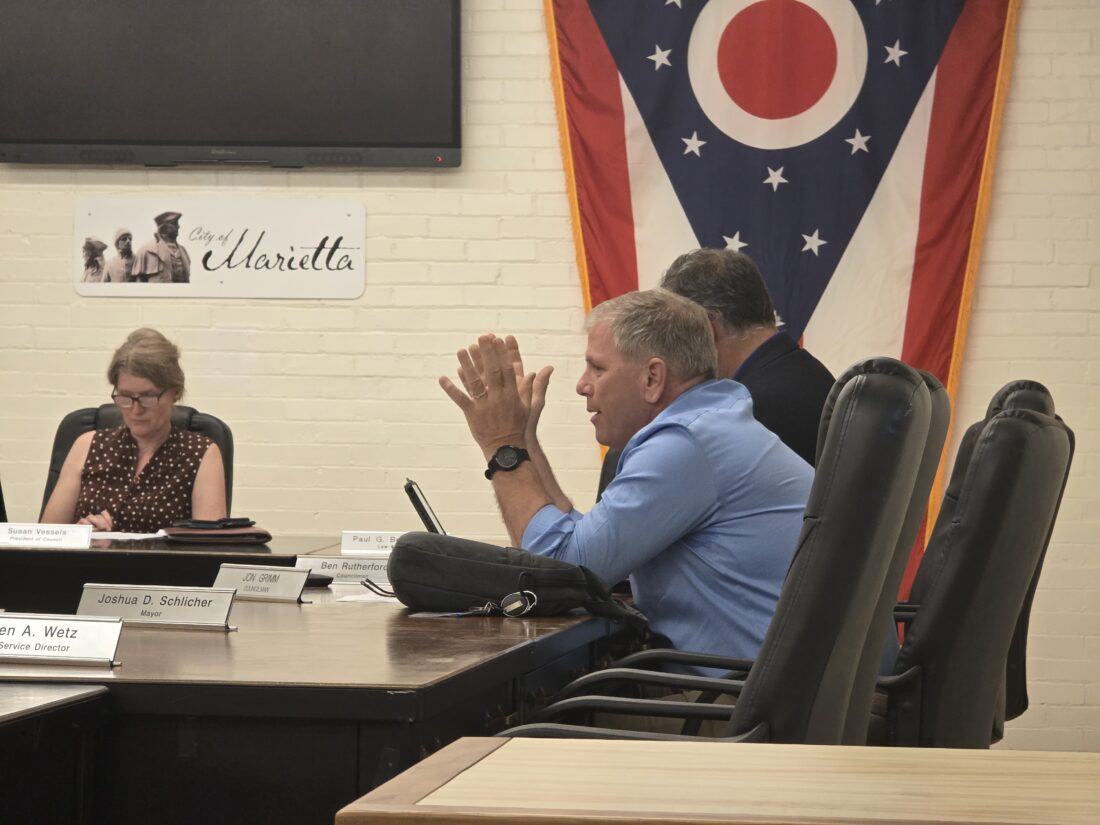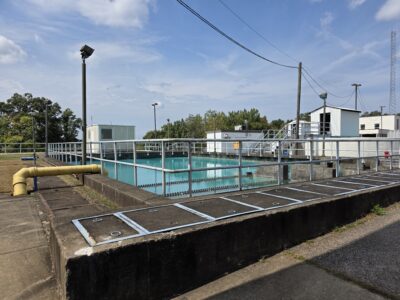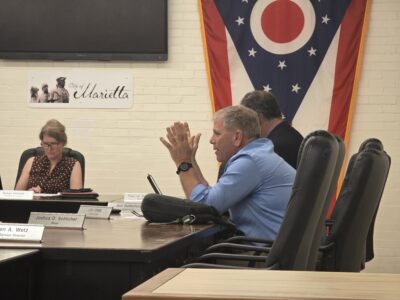Second reading for Marietta City Council injection well committee resolution

From left, Marietta City Council President Susan Vessels listens to Councilman Jon Grimm discuss Resolution 79 during a special meeting Tuesday. The resolution is meant to establish an Injection Well Task Force Committee as an ad hoc advisory group under the Water, Sewer & Sanitation Committee. (Photo by Gwen Sour)
Marietta City Council held an emergency meeting Tuesday to advance the second reading of a resolution to form an ad hoc task force to study injection wells, while sparring continued over whether the committee could delay potential legal action against state regulators.
Resolution 79, which would create the “Injection Well Task Force Committee” under council’s Water, Sewer & Sanitation Committee until Dec. 31, received its second reading during the special meeting. The panel would include up to seven members appointed by the committee chair.
Council members said the committee’s work and a separate resolution, No. 80, authorizing the law director to challenge the Ohio Department of Natural Resources’ issuance of a Class II injection well permit to DeepRock Disposal Solutions for the Stevens No. 1 well, should advance at the same time. The potential mandamus action would seek to have the well regulated under newer rules that reduce the amount of material that could be injected daily.
“I don’t see a reason why 79 and 80 can’t run concurrently,” said Councilman Jon Grimm. “Council should be fully informed as fully as possible when they make that decision. I don’t think they’re mutually exclusive.”
Some members pushed for a stricter timeline. Councilwoman Erin O’Neill, who was absent from Tuesday’s meeting, proposed that the task force be ratified within 15 days of passage, hold its first meeting within 21 days, and deliver an initial report within 60 days.
“Her timeline was spot on,” Grimm said. “It is very doable and does show a sense of urgency. I would recommend that we amend this to reflect Ms. O’Neill’s timeline.”
Class II wells are underground injection wells are designed to dispose of fluids brought to the surface during oil and natural gas drilling, the most common being brine, or salt water, according to the Ohio Environmental Protection Agency
If approved, the well is proposed to be drilled within two miles of the well field for the city’s drinking water.
Some at the meeting suggested adding a request for a moratorium on injection wells to the legislation. Councilman Mike Scales said he would introduce a standalone measure.
“Next Thursday night, one way or another, I’m bringing a moratorium in. I’m asking for the suspension of the second and third reading,” he said. “I will support the suspension of the second and third reading of Resolution 80, and I’ll bring up the vote for Resolution 79 — up or down, one way or another. It’s over and done with. The public wants an answer.”
Council President Susan Vessels criticized Resolution 79 in an email read into the record, calling Section 4 a stall tactic.
“If gathering information were (Councilman Ben Rutherford’s) true purpose, he would not have included Section 4, which would prevent the city from filing mandamus action against ODNR until after all reputable information is gathered by the ad hoc committee and a report was filed. … The clear purpose of this special meeting is to get Resolution 79 readings ahead of Resolution 80.”
Later, Rutherford responded directly to criticisms about delays and obstruction.
“I think we all get so involved in our own maneuvering and politics in any corner,” he said. “A clear mind would probably look back and say, well, I don’t think…. I tried to start this in July, and we probably could have been completed by September. So I guess the question really becomes, where has the obstruction truly been? Where is that objectively? It’s weird how we see things, and I guess it’s just not being seen straight.”
Grimm said he spoke with ODNR’s chief of the Division of Oil and Gas Resources Management on Sept. 12 and was told the DeepRock permit was a reissue under older rules, but that “the operating … would be under the new rule.”
Grimm said he asked for written confirmation but had not received a response.
Citizens shared their concerns regarding the injection wells.
Resident Jessica Archer warned against forming a committee that could slow action.
“There is very strong support to shut down (the) injection wells in this county,” she said. “If this committee were to go forward, it really needs to be detached and separate from our efforts to shut down the injection wells. … I worry about ending up with bad science based on the timeline that is available. What we’re talking about is a very complex, long-term study … not something that can be done cheap (or) fast.”
Veteran driller Bob Lane said he has experienced direct damage.
“This is a no-brainer,” Lane said. “They’ve had these problems all over the United States, where they put disposal. … It has cost me over a million dollar,s the damage that this has done to my oil and gas production. … The level of radiation in this water is three times what you’re allowed to transport on the highway. There is no way known to man to take radiation out of water.”
Gwen Sour can be reached at gsour@newsandsentinel.com




